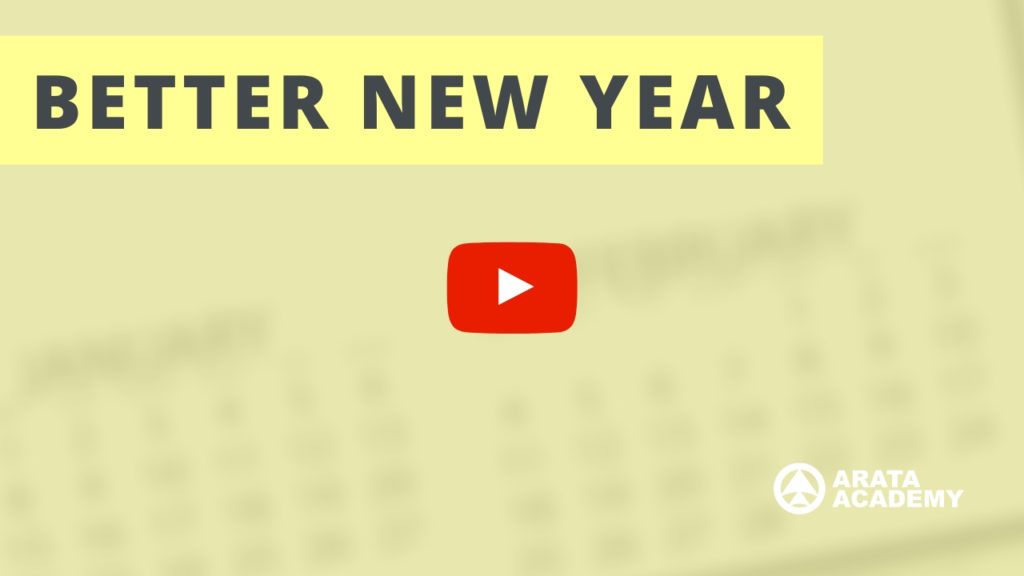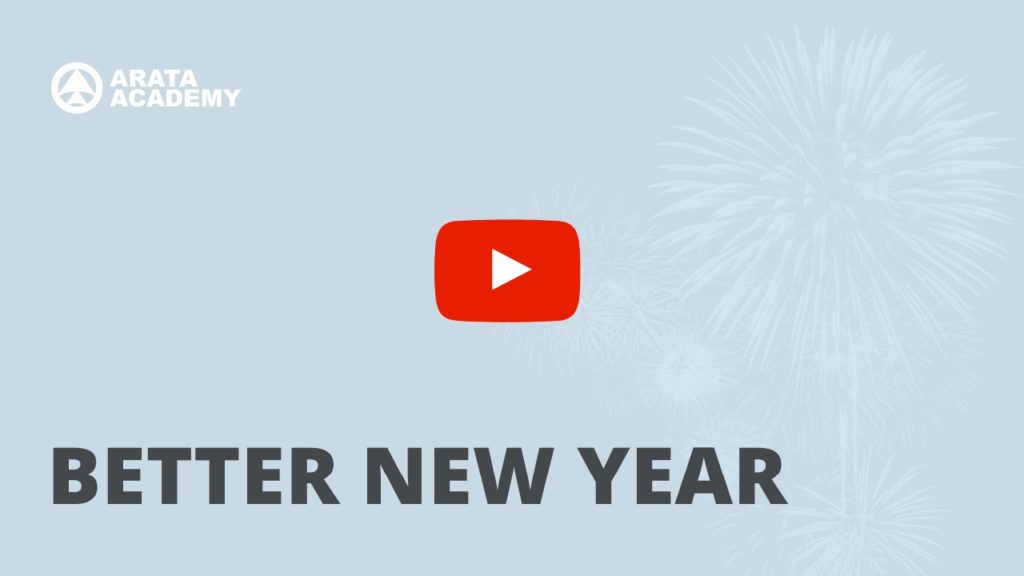Hello! Seiiti Arata. You know, there are two parallel dimensions: what you say with you own mouth, your new year’s promise… and the reality of what will really happen. Why is it difficult to keep the new year’s promise? And, more importantly, what can you do to make your new year’s resolutions efficient?
You already know the most popular new year’s resolutions: this year, I will exercise more and lose 5kgs. This year, I will spend more quality time with my family. This year, I’ll study more.
Some of these promises are efficient and others not very efficient and that’s what we’ll understand today through a very simple trick.
We have already talked about new year’s resolutions on the previous video ( https://arata.se/hello78 ) and today we’ll continue because of how important this topic is. It’s very likely that you have also made different new year’s promises. Some people only think about that and others write in their diaries or calendar what their promises are, that is, the changes they want to implement during the upcoming year.
1. The reality is that your new year’s promise will probably fail.
I will start our conversation by apologising to you. I don’t want to wish you bad luck with your plans for the new year, on the contrary: I invite you to face the truth.
Most people will fail when it comes to their new year’s promises. So it’s important for you to learn how to do something in a different way than what most people do.
I don’t personally know you, but this is the harsh truth of what happens with most people. They decide they will implement a lot of life-improving changes but that lasts for a very short time. What can you do differently, then?
2. Ask questions instead of making promises.
Through a recent study, a team of researchers examined a great amount of scientific data regarding human behaviour. They performed a meta-analysis of multiple studies, covering over 40 years of behavioural research. And what they discovered is very valuable, that’s why I’m sharing the practical tip with you.
If you want to increase the chances of achieving your objectives this year and truly change your behaviour, ask yourself more questions.
Instead of promising “this year I’ll exercise more”, set the promise aside and instead ask yourself: “will I exercise more this year?”
This seems like a small detail, but it works:
Replace empty promises with questions that make you think. This will change the quality of your choices.It will change the way your brain works in your future decision-making. For those who like scientific references, this is connected to the question-behaviour effect, demonstrated by Steven Sherman in 1980.
Basically, when you present a question to someone regarding future behaviours, it’s probable that this behaviour will change.
This effect is even more powerful when the question is presented either through a computer screen or in written form, with a pen and paper.
When scientists examined different sets of people and asked questions such as “are you going to recycle your trash?”, this kind of questioning made participants in the research reflect about their own impact in the environment. They thought about the problems that were caused by not recycling. This way, there was a bigger motivation for them to deal with the negative feeling of not recycling.
Because of that, today, instead of writing in your notebook “I will lose weight”, you can write down a question: am I going to eat healthier this year? Yes or no?
And then take a few minutes to ponder and only after giving it some thought will you write down the answer.
3. Focus on the positive.
The leader of the group of researchers informs us that this type of effect is more powerful and productive when we direct our thought to socially acceptable behaviours. For example, eating healthy, study more, volunteering.
An additional care is necessary when we’re dealing with destructive behaviour. In some cases of people with chronic addictions such as problems with alcohol or narcotics, the results weren’t great.
Set the focus of your new year’s promises to the positive. Instead of “not smoking”, choose instead to promise to “do sports every morning” or any other resolution that makes you want to dedicate your time to positive activities, activities that you wish to perform.
4. Help people reflect
If you have children, you may have understood that it’s not very useful to give advices such as “son, don’t drive after you drink”. Probably, the son will simply say “sure dad” and then he won’t pay attention to it, as he wasn’t forced to think about it. That is, he made an empty promise. It’s similar to the new year’s promise that doesn’t work: there’s no real commitment.
It would be much more effective to ask him a question that will make him think.
You can say “are you the one driving after you go out with your friends tonight? Will you drive after you drink?”
This is a small detail that will make a world of difference. By asking “will you drive after you drink?” You’ll be stimulating the other person’s brain to reflect a little more and provide an answer. This little action brings about a positive change in behaviour.
Remember: according to statistics, the probability of you being consistent when it comes to your new year’s promises is very low.
Because of that, make use of this moment where you’re excited and informed. Right now, you can understand the importance and the value of promoting positive changes during the next year. Instead of simply writing down your promises, start asking yourself more questions. Use a pen and paper and that will stimulate your reflection even more.
Inside our courses’ environment, there’s a special course named Better New Year. The Better New Year course is specially crafted so that you perform the best reflections in order to achieve a result that is the closest to that which you crave for. Visit it now through the link https://arata.se/betternewyear

